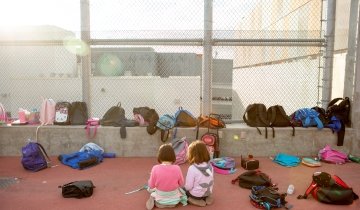May is Foster Care Month, a time to recognize and celebrate the individuals and families who open their hearts and homes to children in need. This month is an opportunity to recognize the work of foster families, social workers, advocates and community members who are dedicated to providing stability and care for children who have experienced trauma and upheaval in their young lives. It is a time to celebrate the resilience and strength of these children, as well as to highlight the ongoing need for more foster families and resources to ensure every child has the opportunity to grow up in a safe and nurturing environment.
Royel Johnson, USC Rossier associate professor, has spoken about his experience in the foster care system and has tirelessly worked to improve the lives of children in the system. His upcoming book From Foster Care to College (Teachers College Press) will be released this fall. He discussed the common misconceptions and challenges that children face and offered suggestions and strategies to support foster care initiatives.
What are some common misconceptions about foster care that you frequently encounter, and how do you address them?
There are numerous pervasive, albeit erroneous, misconceptions about young people with foster care experience, particularly that they are deviant, incorrigible and anti-social. Many people mistakenly assume that the reasons for their placement in care are associated with their own behaviors and actions. It is crucial to note that the foster care system is generally designed for young people who have been exposed to neglect and trauma. The system is disproportionately represented by youth of color, particularly Black youth, which often invites such problematic assumptions. To address these misconceptions, I emphasize the systemic and structural factors that contribute to these youths’ situations, educate people about the realities of the foster care system and advocate for a more compassionate and informed perspective.
What are some of the biggest challenges faced by children in foster care, and how can society better support them?
One significant challenge is the lack of public awareness about the foster care system and the educational experiences of these young people. There has yet to be a national, concerted and sustained effort to prioritize the educational experiences and outcomes of young people in foster care, like there has been for other underrepresented groups. The irony is that youth in foster care are disproportionately more likely to be low-income, youth of color, first-generation and LGBTQ. In other words, they are multiply marginalized across several systems of oppression. Youth in foster care, especially those who age out of the system, experience concerning rates of educational stop-out, homelessness, teen pregnancy and involvement with the criminal justice system, among other outcomes.
It’s not just awareness we need. We need policy at the federal and state levels that universally extend the supports youth are afforded while in foster care beyond the age of 18. We need increases in federal dollars through Education Training Vouchers (ETVs) beyond the $5,000 cap, which has not kept pace with the rising costs of college. Comprehensive reform of the system is necessary to root out racial bias in the investigation of child abuse claims, as Black families are most disparately impacted. Additionally, efforts must be directed toward addressing root causes, not just symptoms.
How can individuals and communities get involved in supporting foster care initiatives during Foster Care Month and beyond?
Individuals and communities can support foster care initiatives in various meaningful ways. Volunteering with local foster care organizations, becoming a mentor or advocate for local youth in care and supporting community programs like LA Room and Board that support disproportionate number college youth in care. We also need to advocate for policy changes at the local, state and federal levels to improve the foster care system and extend support for youth aging out of care is crucial for long-term change. I know that Mayor Bass has a long-standing commitment for youth in care and I’m excited about her leadership in Los Angeles, and what efforts she will undertake in the city.
In your experience, what are some successful strategies for helping foster children transition to permanent placements or reunification with their families?
Successful strategies for helping youth in care transition to permanent placements or reunification with their families include providing comprehensive support services that address the unique needs of each child and family. This often includes robust wrap around services that attend to mental health, educational support, employment services, and life skills training to both the children and their families. Consistent and effective communication between all parties involved—caseworkers, foster parents, biological parents and the children—is essential. Ensuring that foster parents receive adequate training and support to handle the challenges of fostering is also crucial, especially youth of color and those who identify as LGBTQIA+.
Programs that focus on building and maintaining connections with biological families, when safe and appropriate, can facilitate seamless transitions. Post-placement support is also important in ensuring stability and addressing any ongoing challenges arise. We must adopt a holistic and supportive approach.





